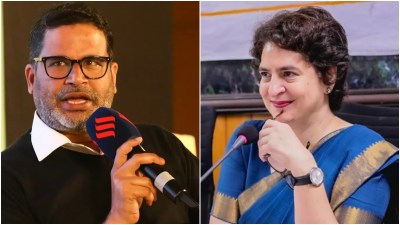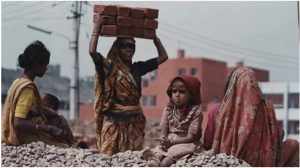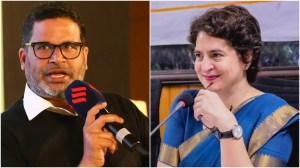
He dismissed the Manipur High Court order regarding the Meitei demand to be included in the state’s Scheduled Tribes list as the trigger behind the May 3 violence, stating that his government had not acted on the court order, giving no reason for the Kukis to be perturbed.
“My top priority is initiating dialogue with all affected communities, including the Meiteis and Kukis. I have already started (conversations) through some (informal) channels with those who have suffered… I am committed to comforting those who have suffered,” Singh said, adding that a peace committee had started working three months back.
Asked why his state machinery did not anticipate tension in the days leading up to the violence, Singh said that while he had asked his Director General of Police to provide security to all vulnerable districts on the day of the solidarity march, he only found out later that this wasn’t done in Churachandpur district which has a majority Kuki population. He said he didn’t want to comment on May 3 further given that it’s the subject of a judicial inquiry set up by the Union government.
“Throughout the day, Governor Madam and I were with the Honourable Vice President, who was visiting the state that day… I don’t want to criticise or condemn… but for the rally, I had requested security to be provided in all vulnerable districts. Unfortunately, I later found out that the DGP did not provide adequate security in the Churachandpur district. He provided security in Kangpokpi and Noney districts. In Noney, the Kuki community is not present. This information will surface during the investigation. I don’t want to say more.. it will be evident in the Commission’s report, which was set up by the Home Ministry,” he said.
In response to the question whether the Union Government’s extensive involvement in state affairs, including the appointment of a new DGP, security advisor, and extended visits by Union ministers, signals a loss of confidence in his ability to control the violence, Singh said he was confident of enjoying the Centre’s full trust. He said if the Centre lacked faith in him, they would have already explored “other options”.
Story continues below this ad
“The Central government has full confidence in both me and the state government. However, the situation is being viewed as a conflict between two communities, and I, as CM Biren Singh, belong to one of those communities. If I continue and I hold the same power then it may be seen as an imbalance. To avoid any perception of imbalance, the Centre may be appointing a security advisor, DG, and others. I hold this perspective because if the Centre did not trust me, then they always have other options,” he said.
The Chief Minister said the Union Home Minister, in fact, has always given him the confidence to not give up. “Ek mereko confidence diya hai Grih Mantri ji ne ki himmat nahi harna aur himmat se ladna (The Home Minister has given me the confidence to never give up and continue fighting with courage). These words have helped me feel reborn again. Sometimes I was so frustrated, but Grih Mantri ji hamesha vishwas dilate rahe (but he always helped me keep faith).”
Singh brushed aside any concerns of losing his constituents’ trust given that recently a mob tried to storm his ancestral home. It was his constituents, he said, that didn’t allow the mob to reach his house and that the incident was political and instigated by members of the Opposition.
Stating that while he was shocked to see the video of the Kuki women being paraded naked, the Chief Minister said that he also wanted to applaud the Meitei people who stepped in to save the women and help them return home. “The two women, whose uncle and nephew were tragically killed, were ultimately rescued by members of the same community to which the culprits belonged. While I condemn the actions of the eight individuals involved in this unlawful act, I also appreciate those who stepped in to save the victims from the mob, helped them get dressed, and sent them back home. Following the incident, it was not the police that raided the culprits’ homes. But it was the Meitei community that mobilised and handed over the culprits to the authorities,” he said.
Story continues below this ad
Asked why he hasn’t met any of the victim’s families yet, he said, “I wanted to go and console the Kuki families, but I was not permitted to do so. By that I mean that at that time, the situation was tense, and I felt that I was being targeted and blamed by the Kukis. I’m not sure why, and I believe that ultimately, it’s up to God to determine who was right and wrong. However, because I didn’t visit the Kuki families, I also refrained from visiting the families of the Meitei victims. I was concerned that people might perceive it as a biased gesture.. ki dekho metei hai isiliye metei ke pass jaa raha hai (see he’s visiting Meiteis cause he’s a Meitei himself). I am facing this dilemma, which is the most challenging part for me. But I have visited relief camps in both communities.”
Singh also said that the Free Movement Regime, introduced in 2018, which permits tribes living along the India-Myanmar border on either side to travel up to 16 km inside the other country without a visa, should have never been implemented. He said, “Those individuals belong to another country and are free to move up to 16 kilometers within our territory. Who will keep track if they have returned or settled here? Who will determine this and take action?”
When asked how, as a Meitei CM, he intends to address the concerns of the Kukis to ensure he represents all communities impartially, Singh pointed out that he has Kukis in his inner circle of officers. He also mentioned that his past actions as CM, including the decision to recognise ‘Kuki Rising Day’ to mark Kukis’ fight against the British and recognise it as a gazetted holiday demonstrate his impartiality.
“All Manipuri Kukis love me and trust me. It’s the outsiders who are threatened by my actions and are worried that they will be identified and sent back,” he said.

































